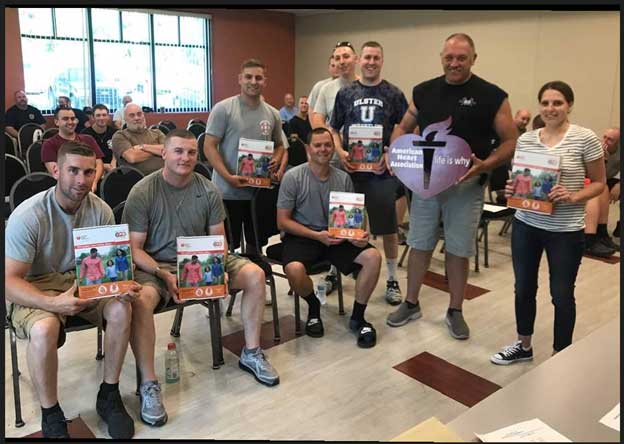Danielle's HCM Story

Danielle Allen, photographed when she was a guest speaker for the 2023 Hudson Valley Go Red for Women’s Woman of Impact initiative, had a cardiac arrest in 2018, just months after she was diagnosed with hypertrophic cardiomyopathy. Now she’s committed to helping fellow heart disease survivors advocate for themselves. (Photo by Jess Davis/Ulster County Regional Chamber of Commerce)
After her cardiac arrest, woman’s family prepared for the worst
An avid softball player growing up, Danielle Allen got winded quickly while playing on an elite travel squad. She figured everyone did.
But at age 19, a doctor told Allen she had a heart murmur, and an echocardiogram showed a pinhole in her heart.
For the next 13 years, she had annual cardiology visits, and her life continued as planned. She finished her bachelor’s degree in psychology, worked full-time as a Medicaid service coordinator for people with developmental disabilities, started her master’s program in social work and got engaged.
Then one day in 2017, Allen became breathless, her chest was heavy and she felt dizzy. At first, she figured it was a panic attack because she also deals with anxiety. But the symptoms lasted a week.
“It was like a panic attack that just went on,” said Allen, who was living in Kingston, New York. “I knew something was physically wrong.”
Allen went to the hospital, where she was told her heart rate was 200 beats per minute. She was diagnosed with atrial fibrillation, or AFib, a quivering or irregular heartbeat that can lead to blood clots, stroke, heart failure and other complications.
An echocardiogram also showed she had obstructive hypertrophic cardiomyopathy, or HCM — a condition in which the heart walls thicken and stiffen, making it more difficult for the heart to pump blood. This can cause shortness of breath, chest pain, heart palpitations, fatigue, fainting and other symptoms.
Six months later, at age 32, Allen was on the treadmill at the gym when she had a sudden cardiac arrest.
Someone called 911, and rescuers arrived within minutes. They began CPR but would quickly lose her pulse. Then, after shocking her twice with an automated external defibrillator, or AED, Allen’s pulse returned long enough to get her to the hospital.
Later, she was told by paramedics she was without oxygen for 14 minutes.
Allen had seizures throughout her first night in the hospital. For the next seven days, she was in a coma.
When a brain scan showed no activity, her family prepared for the worst.
While nurses were removing Allen from life support, she heard one of them say, “It’s April 2.” The date stood out because it was her dad’s girlfriend’s birthday. Allen turned to her dad’s partner and said, “Happy birthday.”
Waking up from the coma was a miracle, Allen said. Even more extraordinary, her long-term memory appeared intact.
Allen spent the next month recovering in the hospital and got an implantable cardioverter defibrillator, or ICD, to regulate her heartbeat. She was transferred to a brain trauma center for a month, where she had to relearn walking and other basic skills such as getting dressed and telling time.
Allen was still determined to have the wedding she had dreamed of. She walked down the aisle on July 6, 2018 — four months after the cardiac arrest — without a walker.
For the next two years, Allen continued to focus on rebuilding her physical abilities and brain capacity.
“I pretty much behaved like a 10-year-old,” she said.
Today, her brain is back to functioning like a person her age, although she continues to deal with lingering health challenges, such as her AFib and post-traumatic stress disorder related to the cardiac arrest.

The year after her sudden cardiac arrest, Danielle Allen (far right) raised over $4,000 in the Hudson Valley Heart Walk, so she was able to donate CPR training kits to a place of her choosing. She chose Ulster Hose Co. No. 5, the fire and rescue company whose first responders saved her life. (American Heart Association)
Allen, who now lives in Florida, is receiving treatment from a health care team with specialized training at a cardiomyopathy center. While she can no longer focus on previous passions such as exercise, she’s shifted to something she’s found even more meaningful: helping fellow heart disease survivors advocate for themselves. She’s volunteered, participated in and spoken publicly at events including Heart Walks, Go Red for Women functions and more.
“Over these past six years, I’ve learned a lot, and life has taken me on a different path,” she said. “I’m dedicated to improving the lives of those with heart disease in any effort I can.”





